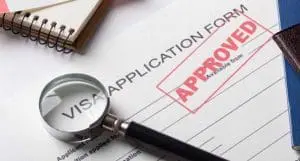Ireland Student Visa
Ireland is one of the best places in the world for research and quality education. Nigerians who wish to study in Ireland can obtain a student visa provided they meet the eligibility requirements. Knowledge of Irish immigration policies and procedures is essential for a favourable decision.
If you wish to learn more about how to apply for the Irish student visa, its processes and requirements, contact our Immigration Advice Service (IAS) lawyers at +2342013306361 or message us online.
Request a call back from our immigration experts
Benefits of Choosing IAS‘ Ireland Immigration Lawyers
When it comes to obtaining an Ireland visa or permit, IAS Ireland immigration lawyers are well-equipped to help you.
With IAS’ track record of successfully helping clients visit or immigrate to Ireland successfully, we can help you achieve your goal.
Our dedicated immigration lawyers provide our services through a comprehensive and personalised approach. With IAS, you enjoy:

Compassionate support from an experienced immigration lawyer dedicated to your success



Support in gathering supporting documents and completing a high-quality application.



Confidence that your case is being handled by an experienced team.



In-house document checks done by lawyers who are well-versed in Ireland immigration matters.
Services we Provide
What is an Ireland Student Visa?
The Irish student visa is for students from outside the EU/EEA region who wish to study in Ireland. Nigeria is a non-EU/EEA country. One of the benefits of the Irish student visa is that you can work part-time and pay your bills while studying.
The Irish student visa can allow you to stay longer for employment opportunities after your studies, provide a valuable platform for international work experience and contribute to personal and professional development.
Nigerian Emigration
For Nigerian emigration matters, please call +2342013306361 or +44 (0) 3316300929
Other Immigration and Emigration Matters
For immigration/emigration to/from other countries, please call:
US – +1 844 290 6312
Ireland – (+353) 061 518 025
UK – (+44) 333 4149244
Eligibility Criteria and Requirements for Nigerian Students
Nigerians are eligible as long as they meet the criteria and requirements listed below:
- Confirmation that you have been accepted into an Irish school, college or university to attend a course of study
- Your program choice must be full-time and last an academic year, requiring at least 15 hours per week or short-term, lasting 90 days
- The course you applied for is approved by the interim list of eligible programmed (ILEP)
- Evidence of your intellectual ability to pursue the program of your choice in English (unless the course you wish to study is an English language course)
- Evidence of full payment of school fees
- Proof that you or a sponsor has a minimum of €10,000 available for the years that follow the study, in addition to course fees
- Proof that you have private health insurance
- A justification for any gaps in your academic record
- Evidence to prove that you will go back to Nigeria or another country when you are done with your studies in Ireland
IELTS Requirement for Ireland Student Visa
The International English Language Testing System (IELTS) is an English proficiency test for prospective international students. It is accepted worldwide. Nigerians who want to further their education in Ireland can take the IELTS to prove their proficiency in English.
The Irish Naturalisation and Immigration Service (INIS) states that the minimum IELTS score requirement is a general score of 6.5 on the band scale of 9. The test comprises listening, speaking, writing, and reading.
However, some universities may waive the IELTS requirement if you have prior evidence of English language learning.
Your level of study or type of degree will determine the required score. Below is a summary of the English proficiency standards expected.
| S/N | Type/Level of Study | Minimum Score Requirement |
| 1 | Foundation courses | Band score of 4.5 |
| 2 | Bachelors | Band score of 6.5 |
| 3 | Postgraduate | Between 6.0 to 7.0 band score |
Required Documents for the Ireland Student Visa Application
The following are vital documents essential to securing the Ireland student visa:
- A valid Nigerian Passport
- Letter of Admission from a recognised and accredited institution in Ireland
- Proof of funds available to you
- Your passport that aligns with the Irish immigration requirement
- Your Health insurance
- Your statement of purpose (SOP)
How Do You Apply for an Ireland Student Visa?
Nigerians who wish to study in Ireland must apply for a visa in Nigeria before travelling to Ireland. Here is a guide to applying for a student visa.
Step 1: You can apply online via the Irish immigration website. The online system will generate an Application Form.
Step 2: Follow the steps on the application form. The instructions for submitting the required documents are also on the application form. You are also required to submit the visa application questionnaire.
Step 3: Print the visa application form. Sign in and place a date before submitting it, along with a coloured copy of your original documents. The Irish visa application must be submitted at a visa application centre on your appointment day.
Step 4: To capture your biometrics, visit an Irish visa application centre (VAC). VFS Global is in charge of Irish visa applications in Nigeria. VFS Global, Nigeria, has offices in Lagos and Abuja. You must book an appointment online before visiting the visa centre to submit your biometrics.
VFS Global staff will take your fingerprint and other necessary details. You will be given a reference number to track your application.
Note that if you are not a Nigerian but a resident of Nigeria, you can apply at VFS Global Lagos or Abuja. Also, if you are a Nigerian living in another country, you should apply at the visa application centre where you reside.


Ireland Student Visa Cost
Irish student visa fees differ depending on the number of times you wish to travel. For Nigerians applying for a long-stay or short-term student visa, the typical processing fee for the visa application is €60, the fee for single entry.
Multiple entries cost €100. The visa fee is an administrative fee that covers the costs of processing your application. You will not be reimbursed if your application is denied or withdrawn.
The visa fee will be paid in naira at the VFS Global Centre on the day of your appointment via POS, QR code, or cash. Due to fluctuating rates, the application fee in naira depends on the exchange rate for that day. An additional amount, NGN 104,849, known as the service charge fee, is paid online when booking the visa appointment.
Ireland Student Visa Processing Time and Success Rate
The processing time starts on your appointment day at the VFS Global Centre in Abuja or Lagos and ends when you receive a decision on your visa. Generally, it takes eight weeks to process.
You may need to wait longer if you apply for a certain study visa type. The types of visas are shown below:
| S/N | Type of study visa | Description | Processing times |
| 1 | C-Type Study Visa | Short-term courses up to 3 months | Between 3 to 8 weeks |
| 2 | D-Type Study Visa | Longer academic courses | Between 4 to 10 weeks |
| 3 | Post Study Visa | For graduates seeking employment after graduation | Between 5 to 12 weeks |
Some factors can impact the processing time of the Ireland student visa, such as the number of applications received and the accuracy of the information in your application.
Your application should not contain false or misleading information or documents. If you do, your application may be denied, and you may be barred from obtaining an Irish visa for another five years.
You should apply for the Ireland student visa three months before the expected departure date to avoid any inconvenience and delay. The success rate of the Irish student visa is high. According to the Irish Department of Justice, 88 per cent of visas were approved in the first quarter of 2024.
If you are applying for an Irish student visa, there are common reasons why your visa may be rejected. If your application was denied, our expert lawyers at IAS can help you file an appeal.
Tips for a Successful Ireland Student Visa Application
You must be mindful of pitfalls that can lead to visa rejection. For a successful application. Below are some of these pitfalls:
- No evidence to prove financial capability: This is a significant reason for visa denial. Nigerians applying for an Irish student visa must demonstrate that they have the necessary funds to cover school fees and expenses associated with living and studying in Ireland
- Incorrect and incomplete applications: Errors or omissions on the visa application form can result in a visa being rejected. Providing accurate information is vital
- Lack of sincere intention: Visa officers determine whether or not you intend to return to Nigeria after your study in Ireland. If your motives are questioned, the visa may be denied
- Poor English Proficiency: English is the primary mode of instruction in most Irish universities. Nigerians seeking a visa may be required to show their capacity to communicate and write in English by taking and passing the standardised IELTS or TOEFL
- Criminal record or security threat: Applicants with a criminal history or who pose a security risk will not be considered for a visa
- Past immigration violations: If you have stayed longer on a previous visa or worked illegally, you have violated an immigration policy. Violating immigration policies can negatively impact visa decisions
- Lack of necessary supporting documents: Failure to provide all the required supporting documents and records, such as academic transcripts, university admission letters, evidence of accommodation arrangements, etc., can result in visa denial
Providing the necessary documents to back the visa application is vital. Our lawyers at IAS can help review your application to ensure they meet the criteria.
If you are applying for a student Ireland visa, there are strategies to strengthen your application for approval. These strategies include:
- Prompt Preparation and good documentation: It is better to prepare your application well before the course starting date. Make sure all documents are properly prepared and in order. Submit valid test scores for the IELTS as required
- Financial Readiness: You must demonstrate sufficient financial resources to cover tuition, living expenses, and other associated costs during your stay in Ireland. Take time and effort to support expenses through appropriate resources and accounting documents like bank statements and sponsorship letters
- Adhere strictly to instructions: Adhere to the instructions provided by the visa application authorities for submitting the application, supporting documents, photograph specifications, and other appropriate details. Failure to follow instructions could result in the application being rejected
- Uphold transparency and stay updated: Be transparent and open with visa officials. Give truthful and thorough answers during interviews or additional enquiries to demonstrate your truthfulness and reliability as an applicant
- Check the Ireland immigration website regularly for any new developments or changes to visa policies and requirements
- A well-drafted statement of purpose (SOP): Be clear regarding your study and career goals. Be prepared to clarify how studying in Ireland aligns with your academic and professional goals
- A well-drafted SOP explains what motivates you to study at an Irish university and describes your plans and eligibility. Our expert lawyers at IAS can draft a compelling SOP for a successful visa application


Ireland Student Visa Extension and Renewal
If your studies take longer than the time that your Ireland student visa is valid, you will need to apply for an extension. You must present the following documents:
- The biometric page of your passport
- Your recent Irish Residence Permit (IRP) card
- Proof of registration into a full-time program in an Irish university
- Past semesters results
- Proof of payment of university school fees
- Evidence of enough financial resources
- Evidence of personal health insurance that covers the length of your stay in Ireland
- Proof that you attended your classes
- You must show evidence if you had to defer your admission due to health reasons
- Proof of consent from your guardian if you are below 18 years old
You must apply for a student visa renewal while you are still in Ireland and your visa is still valid. The extension should be made 30 days before your student visa expires.
However, applying three months to the expiry date is better to give more time to the application process. Your new IRP might take two weeks or more weeks to arrive.
How you apply for a student Ireland visa depends on where you reside in Ireland. For those living outside Dublin, you must apply in person, but if you live in Dublin, you must apply online.
Renewing Your Applications From Dublin
Step 1: If you live in Dublin, the first step in the application process is to visit the Irish immigration website and apply for permission to renew.
Step 2: Complete the renewal form and upload your documents where necessary. After that, you must pay the €300 Ireland student renewal visa fee via debit or credit card.
Step 3: Submit your application. Your Irish resident permit (IRP) will be sent to you by post.
Renewing Your Applications Outside Dublin
Step 1: The first step in the renewal process is to book an appointment at the closest registration office through the Irish immigration website.
Step 2: Assemble your original documents and visit the immigration office for your renewal appointment.
Step 3: Fill in the renewal form and pay the €300 fee. You will be given a unique application number and receipt of payment. You will be informed when your IRS is ready for collection. Our experienced lawyers can ensure timely renewals to avoid legal issues and deportation.
Ireland Student Visa and Family Dependents
Generally, you cannot bring your family to Ireland with a study visa. A spouse or dependent child who wants to join you must apply for their visa separately.
The status of your visa cannot be used to grant them a visa to Ireland unless:
- Your child wants to visit you for a short period. In this case, you must show evidence that your child will leave Ireland after the visit
- You give birth while in Ireland, the child will be allowed to stay with you
- You are a PhD student, and you have the financial ability to take care of the family you are bringing. However, this right ends after four years of study
- You are part of an agreement between Irish and another state for you to participate in an academic program
A child under 18 who is granted an Ireland student visa must submit a consent form signed by parents or guardians. If the child is not followed by an adult when travelling to Ireland, the consent form must contain details of the individual who will cater for them throughout their stay.
The consent letter must also contain a statement from the guardian in Ireland that they agree to the child coming to Ireland for study purposes. In addition, the parents or guardians must submit their passports containing their biometric or national identity cards.
It is important to note that parents of children under 18 who apply for a study visa can only accompany or join their child with a student visa if they apply for another visa.
Who Is a Sponsor for an Ireland Student Visa?
A sponsor is an individual who signs the financial consent form showing their interest in being financially responsible for you while you are on a student visa. A sponsor is also the individual who is a guarantor of your student loan.
A sponsor must show six months of bank statements to prove they can sponsor you. However, for children under 18, the parent or guardian can be the sponsor.
Post-study Opportunities and Pathways to Residency
Nigerians can choose to remain in Ireland after their studies. Permanent residency will allow applicants to live and work in Ireland indefinitely. A permanent residency holder can access public services and later apply for citizenship. With citizenship rights, you will be eligible to hold a public office or vote.
As part of the requirement for permanent residency, you must reside in Ireland for at least five years. This five-year duration starts counting from when the Department of Enterprise, Trade and Employment issues you a work permit.
A study visa cannot be used directly to obtain permanent residency (PR). Before applying for PR, you must have a valid work or critical skill permit. However, Nigerians on a study visa can transition to getting a residency through a pathway as explained below:
Step 1: Choose to Intern While Pursuing Your Studies in Ireland
Applying for an internship while studying in Ireland is advisable to gain work experience. While studying in Ireland, you can work 20 hours per week. During breaks from your studies and other vacations, you can work 40 hours per week.
You are advised to obtain an internship in a department or discipline of your choosing at the organisation you hope to work for.
Step 2: Seek a Work Permit
You can apply for post-study work permits in Ireland after completing your degree. You can secure a job and apply for an Irish General Work Permit or a Critical Skills Employment Permit.
Applying for a Critical Skill Employment Permit rather than a General Work Permit can increase your chances of getting a work permit quickly.
Step 3: Extend Your Work Visa
You should extend your work visa if you have not stayed in Ireland for up to five years. Obtaining an extension of the General Work Permit and Critical Skills Employment Permit for a maximum of three years following the expiration of the first time limit is fundamental to obtaining a Permanent Residency (PR) in Ireland after your education.
If your work visa application is extended, you can stay in Ireland for five years.
Step 4: Apply for Permanent Residence (PR)
PR applications are normally processed within 6-8 months. You must submit your application and documents to the Irish Naturalisation and Immigration Service.
After five years, you may seek citizenship or renew your permanent residence. Below are the essential documents for obtaining a PR in Ireland at the end of your study:
- A copy of your valid Nigerian passport showing your Irish visa stamp
- Your birth certificate
- A copy of your employability/work permit
- Proof that you live in Ireland, such as your utility bills or a rental agreement
- Proof that you are financially stable
Our lawyers at IAS can help you plan your transition from an Ireland student visa to obtaining PR.
Ireland Permanent Residency Application Fee
After your PR application is accepted, the candidate will receive their decision by mail from the Immigration service delivery.
The applicant is then required to send in an application fee. The application fee costs €500. After receiving the letter, you are given 28 days to pay.
Payment can be made via post or bank transfer. You must register for PR with the local Ireland immigration office.
How Can IAS Help?
Applying for an Irish student visa from Nigeria may be challenging, especially when gathering the necessary financial documents or navigating the online application process. An experienced immigration lawyer can help you go through these challenges.
We offer comprehensive services to support Nigerian students and ensure the best possible chance of a successful application. Our services include:
- Initial consultation to full representation: At IAS, our lawyers are highly experienced and will provide the necessary support from your initial consultation with us throughout your immigration journey
- Concierge Services: At IAS, we provide additional support to help you settle when you arrive in Ireland. We will ensure your school placement and housing are settled and help book your flight from Nigeria to Ireland
- Immigration Journey Planning: Our IAS expert team will ensure you comply with all visa requirements. Our support does not end when you arrive in Ireland. We can also help you renew your visa
We can also provide a long-term plan for you, which includes getting a work permit after your studies and obtaining citizenship in Ireland. We are ready to address your concerns or queries regarding your application.
Please contact our experienced lawyers at IAS at +2342013306361 for assistance applying for a student visa in Ireland or message us online.
Table of Contents
Table of Contents will appear here.Legal Disclaimer
The information provided is for general informational purposes only and does not constitute legal advice. While we make every effort to ensure accuracy, the law may change, and the information may not reflect the most current legal developments. No warranty is given regarding the accuracy or completeness of the information, and we do not accept liability in such cases. We recommend consulting with a qualified lawyer at Immigration Advice Service before making any decisions based on the content provided.
Frequently Asked Questions
Yes, a Police Certificate (PCC) is usually required for an Irish student visa to ensure that you do not have a serious criminal history.
When you arrive in Ireland, you must apply for an Irish resident permit within three months (90 days) if you plan to stay for more than three months and are on a long-stay visa.
It is legal to get married in Ireland while holding a student visa. But, you must comply with all legal procedures and inform the Irish Naturalisation and Immigration Service (INIS) of your plan.
While there is no maximum age for studying in Ireland, some institutions may have age requirements for specific courses or programs.
If your Ireland student visa application was rejected, the reason for the rejection will be stated in the rejection letter. The reason for rejection will determine if you are reapplying or appealing the case. Our Lawyers at IAS can help you file an appeal or reapply.


What our clients are saying
How our UK Immigration Lawyers can help
At the Immigration Advice Service our lawyers specialise in a wide range of UK visas, nationality and asylum applications and have represented clients in various successful complex and high-profile cases.




























